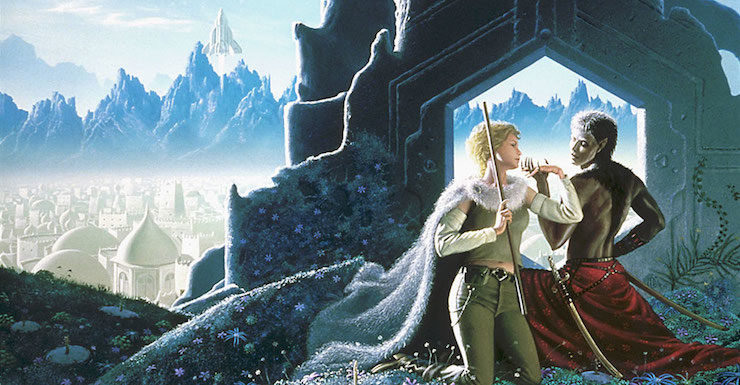Once more into the past, this time armed with a more comprehensive list of women who debuted in the 1970s¹. In fact, my list has become long enough that I am going have to tackle the authors letter by letter, moving forward. In this case, I am looking at women authors who debuted between 1970 and 1979 and whose surnames begin with G.
Sally Miller Gearhart
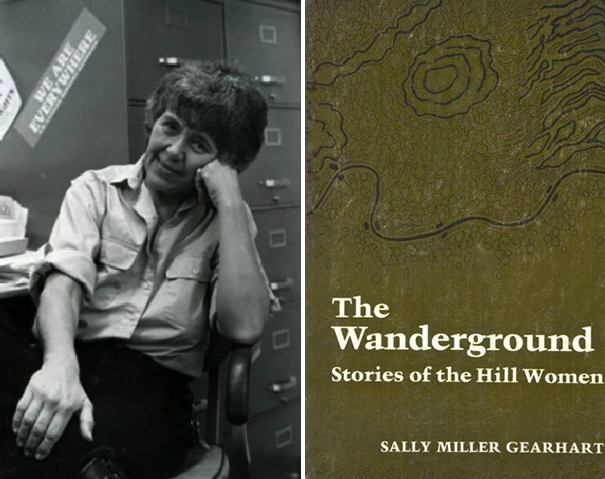
Gearhart may be best known now for her political activism and her decades of scholarly work. The Sally Miller Gearhart Chair in Lesbian Studies at the University of Oregon is named for her. SF fans unacquainted with her work might do well start with The Wanderground, a novel about feminist separatism set in a near future. Any of you planning to write a feminist separatist novel (or found a separatist feminist community) might want to explore prior art, including Gearhart’s contributions.
Mary Gentle
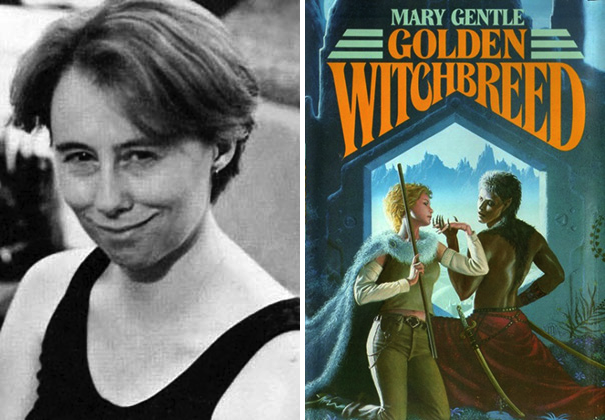
The least-aptly surnamed author in speculative fiction, Gentle is prolific, talented, and in no sense gentle. The best starting point for Gentle is her 1983 two-cultures-in-contact story, Golden Witchbreed, the first in the Orthe series. Caveat: you might want to be wary of the sequel, which expands on the setting in ways that many fans of Golden Witchbreed have disliked and loudly protested.
Dian Girard
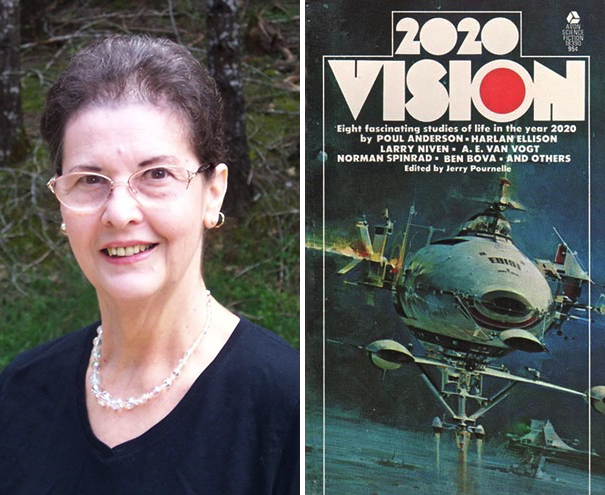
Under her maiden name Girard, Dian published a number of short pieces in venues like Amazing, Galaxy, and Jerry Pournelle’s 2020 Vision². As J. D. Crayne, she made a lateral move into mystery—yet another loss for SFF and gain for the mystery genre. (The mystery audience is ten times the size of SF’s; mystery writers can often indulge in such luxuries as food, clothing, and shelter.) Her story “Eat, Drink, and Be Merry,” which sets one determined woman against a society determined to monitor her diet for her, would be an excellent starting point for Girard… if it had not been out of print for more than four decades.
Lisa Goldstein
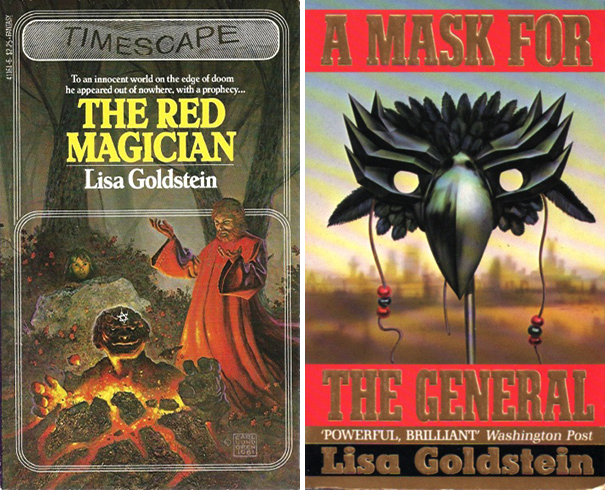
A better-read reviewer than I would almost certainly recommend reading Lisa Goldstein’s award-winning The Red Magician. However, I have not yet gotten around to it; the book has been living in my Everest-emulating Mount Tsundoku since it came out in 1983. I can, however, recommend A Mask for the General, which relates an artist’s unconventional struggle against the brutal autocrat who has ruled America ever since an economic crisis undermined American faith in democratic institutions³.
Jeanne Gomoll
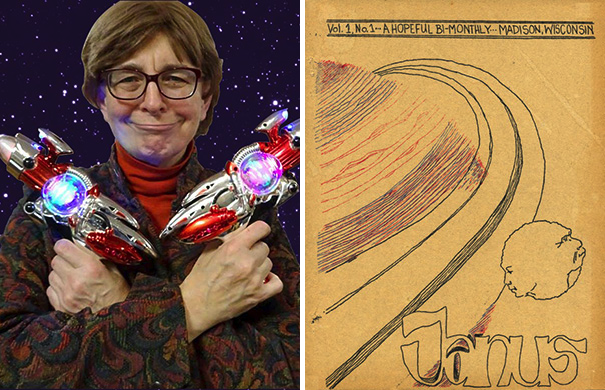
Editor, artist, and essayist Gomoll’s body of science fiction is comparatively small; I don’t think I’ve read any of it. No worries, because the Gomoll I would recommend is her non-fiction (but SF-related) essay “An Open Letter to Joanna Russ,” available online here. In it she discusses yet another example of the sort of historical erasure I am hoping to, in turn, erase.
Eileen Gunn
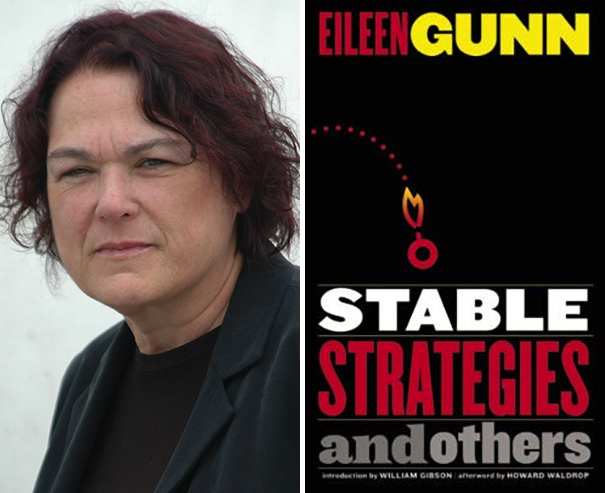
Gunn’s fiction has thus far been of the short variety; the trick with such authors in this collection-and anthology unfriendly world—curse you, Roger Elwood!— can be to find something still in print. Happily with Gunn, this is no problem. Her 2004 collection Stable Strategies and Others contains (among other works) the 1989 Hugo Award Finalist “Stable Strategies for Middle Management,” the 1990 Hugo Award Finalist “Computer Friendly,” the 2004 Nebula Award winner “Coming to Terms,” and the 2006 Nebula Award Nominee and James Tiptree Jr. Award Shortlisted novelette (co-written with Leslie What) “Nirvana High.”
***
The best part of having greatly expanded my list of women who debuted in the 1970s is that I can now appreciate just how much I do not know, Learning new things gives me an endorphin rush, so I look forward to new and better drug highs. Please help. I am unfamiliar with the following authors and would invite useful commentary:
- Joan Garrison
- Roberta Gellis
- Anna Louise Germeshausen
- Catherine Gleason
- Margaret Greaves
- Joyce Ballou Gregorian
1: Nota bene: this series only covers women whose published careers began between 1970 and 1979. If their career began before 1970 or after 1979, then they fall outside my target range.
2: Which I will review on my own site Sunday, Jan 5th, 2020, probably about 3:30 AM. Kitchener time. Because stuff and things.
3: A Mask for the General is inextricably entangled in my mind with Pat Murphy’s The City, Not Long After, which also pits artists against autocrats.
In the words of Wikipedia editor TexasAndroid, prolific book reviewer and perennial Darwin Award nominee James Davis Nicoll is of “questionable notability.” His work has appeared in Publishers Weekly and Romantic Times as well as on his own websites, James Nicoll Reviews and Young People Read Old SFF (where he is assisted by editor Karen Lofstrom and web person Adrienne L. Travis). He is surprisingly flammable.










